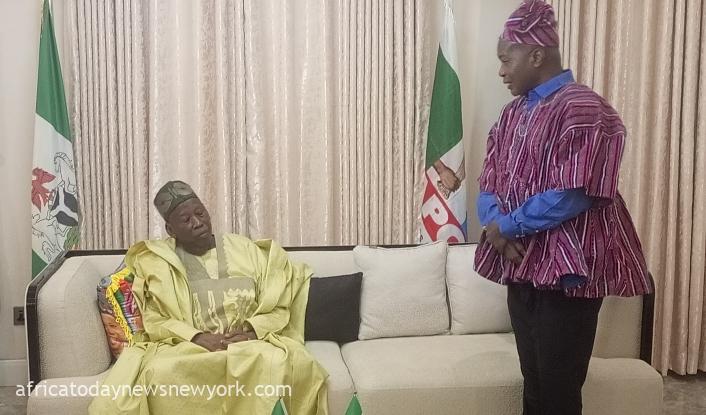Abdullahi Ganduje, the National Chairman of Nigeria’s ruling All Progressives Congress (APC), informed Stephen Ntim of Ghana’s New Patriotic Party (NPP) that the remedy for the increasing military coups in West Africa is effective governance.
Speaking at the APC National headquarters in Abuja, Ganduje engaged in dialogue with a delegation from Ghana’s ruling party, headed by Ntim.
The Chairman of the APC National Committee highlighted that when good governance is in place, the populace itself becomes a barrier to military involvement in the governance of African nations.
He pointed out that the presence of robust governance systems would empower the people to resist military interventions, safeguarding the integrity of democratic rule.
‘This kind of visit is important and good to help us exchange ideas on how to deliver good governance to the people, and it can even reduce the tide of military incursions that we are witnessing recently.’
Read also: Kano: You’re Serial Loser, Ganduje Attacks Kwankwaso
‘While we are discouraging military coups, we must improve our governance systems, when this is done, the masses will be the first to even resist any such military interventions’, the APC chairman said.
Recognising the deep-rooted historical ties between Nigeria and Ghana, he proposed that it is highly appropriate for the ruling parties of both countries to engage in a dialogue about delivering good governance to their people.
He framed the visit of the NPP national chairman as a significant step in strengthening the ties between the ruling parties of both countries. He pointed out that Ghana and Nigeria’s shared values and political history make this interaction particularly meaningful.
Ganduje remarked that the historical ties between both countries were deeply rooted, drawing attention to their shared colonial history and the use of English as a common national language.
He reflected on the harmonious path to independence from Britain that both nations followed, where they retained English as their official language, bolstering their camaraderie among their Francophone neighbours.

